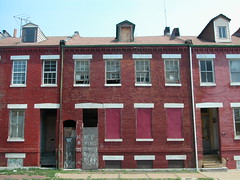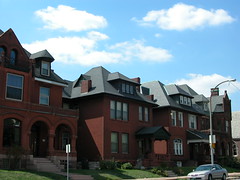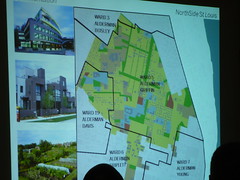Throughout the brief history of this blog I strove to make the content as universal as possible. While I understand the gravitas that place-specific writing can imbue I had preferred to leave specific local issues to other bloggers.
That time has ended. I feel I must comment on the rapidly changing situation in North Saint Louis.


While the situation is covered thoroughly at Ecology of Absence and Built St. Louis I will summarize the situation. Additionally, a two year old primer on the situation can be found here.

A private developer working secretly through many shell companies has acquired 1,080 parcels throughout five neighborhoods over the past half decade. The parcels, once acquired, have been left unsecured leading to crime, collapse, and the particular plague of Saint Louis: brick rustling. Soon after the scale of the acquisitions became public knowledge due to the vital efforts of residents Michael Allen, Barbara Manzara and others, a lawyer working for the prominent developer linked to the companies involved drafted the Missouri Distressed Land Assemblage Tax Credit. Due to the sheer scale required to qualify the legislation was widely understood to be a tax handout to one specific developer. That developer? The intensely connected Paul McKee Jr. (chairman of the board for Barnes Jewish hospital and major diocesan fundraiser) who in the post-secrecy period is restyling himself as a community builder.

This week we have seen for the first time the "plan" for the redevelopment.
Perhaps more interesting have been the backflips by the formerly critical sources who are now rushing to support the NorthSide plan in a vacuum of detail, leadership, and common sense. (Most notable is one realtor-turned urban crusader eager to burnish his unaccredited planning degree to defend what appears to be yet another rehash of mid-century planning hubris.)
In the spirit of debate I will address my comments on the plan to the aforementioned blogger.
While I was earning my Masters degree in Urban Design (many people have one or more masters degrees these days) a defining moment came in studio while working on projects directly addressing post-Katrina New Orleans. We presented our master plans to our professor only to be told that what we had developed was not a master plan. We created transportation plans, zoning plans, land-use plans, environmental plans, asset retention plans, and yet still we were rebuked for lacking a master plan. It was only at the end of the process that our professor told us to bind dozens of these plans together. This, finally, we learned was a modern master plan.
This is exactly my problem with what has come from McEagle/McKee. There is no unified vision and, despite the oft-repeated expenditure of $46 million, nothing presented has transcended the level of the vaguest diagram. The reductionism of these plans coupled with the unfathomable hubris of the developer and the smugness of the political elite make one feel like it is the 1950's all over again. While this type of proposal has been history in most successful cities for decades, the combination of political ineptitude and corruption with an uninformed and disengaged public has made Saint Louis fertile ground for the swindling of the century.
The era that gave us Pruitt-Igoe indelibly changed the city and in reaction it changed the planning profession. As it became evident that massive public investiture coupled with reductive processes begat ever more striking failures, planners embraced pluralism. As Paul Davidoff wrote [in 1965!]
"Lively political dispute aided by plural plans could do much to improve the level of rationality in the process of preparing the public plan. "
In comparison with the type of planning Davidoff initiated every step of this process has been proprietary and no alternatives have or will ever be considered in an appropriate public forum. The illusion of input has been used, but instead of reshaping planning such comments have been used to redirect rhetoric and develop spin.
Davidoff also states that improved planning would come by
"forcing the public agency [Read: The private developer] to compete with other planning groups to win political support. In the absence of opposition or alternative plans presented by interest groups the public agencies [or private developer in a planning vacuum] have had little incentive to improve the quality of their work..."
The problem with the NorthSide process has been the complacent submission of government at all stages of the project. At this point the McKee coalition needs only ceremonial approval from the government for the project. The city government of Saint Louis has been delegating planning authority to private entities for a half century [it must be noted that this half century saw a precipitous decline in the tax base, population and prestige of St. Louis] and in this case the private entity was able to not only flaunt existing laws with impunity, but to create new legislation for its express benefit.
Finally, the financial end of the project is troubling for several reasons. The development area is staggering in its size and I believe there to be no possibility of funding the entire project. My supposition is born out by the admission by McKee himself that the third of three TIF-financed focus areas will not receive any developer funding at all.
In essence that means that Tax Increment Financing will be awarded for a development that may or may not happen in the future with no commitments whatsoever. The potential for redevelopment for the hundred or so blocks that fall between these questionably-financed focus areas is anyone's guess. The fate of these areas is all the more concerning given that McKee "doesn't do housing" and if anything happens they will be farmed out to suburban homebuilders like McBride Homes. With the combination of TIF financing and the Distressed Land Assemblage Tax Credit we taxpayers are asked to short the tax bases of the City of St. Louis and the State of Missouri a considerable amount. In addition we must build infrastructure and essentially donate city property to a private developer who may or may not actually develop the improved land he holds based on "market conditions". Absent any development he will surely allow his properties to fall further into decay.
Most troubling is that other developers are trying to play this game too. Since last fall another anonymous company has acquired 225 parcels throughout neighborhoods to the north and west of the McKee holdings. This company [Urban Assets] has connections to McKee's acquisition agent Harvey Noble. The question remains: is this more McKee purchasing or is an all out war beginning?
The real question is whether St. Louis is capable of saving itself... or is it too late already?
66 square miles. 800 blocks gone already. 52nd most important city. How much more can we allow ourselves to fail?







1 reactions:
Ok I am never one to support tearing down historic buildings but part of your arguement fails. The city is goignt o give them a TIF and probably tax abatement--so your arguement is that our city is already suffering so why take away from the tax base? But you fail to mention that the VAST majority of these properties do not contribute to the tax base AT ALL. So any development that brings SOME or Little taxes is better than no taxes.
We can nay say all we want but just keeping the status quo another 10 years isnt going to help either. Why dont you with your two degrees come up with a better plan? Circulate that and if its good we will all support it-- but you see that requires WORK. It's now Open Season on work--get to it.
Post a Comment